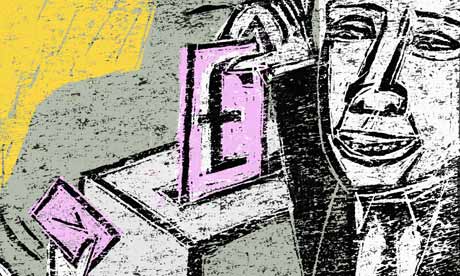Britain is being rebuilt in aid of corporate power
Trust business,
Cameron tells us, self-regulation is a force for social good. Silly me –
I thought it was an invitation to disaster

Illustration by Daniel Pudles
Contrast this call for an extension of the franchise with a piece in the same paper last year, advocating an income qualification for voters. Only those who pay at least £100 a year in income tax, argued Ian Cowie, another senior editor at the Telegraph, should be allowed to vote. Blaming the credit crisis on the unemployed (who, as we know, lie in bed all day devising credit default swaps and collateralised debt obligations), Cowie averred that "it's time to restore the link between paying something into society and voting on decisions about how it is run". This qualification, he was good enough to inform us, could exclude "the majority of voters in some metropolitan areas today". The proposal was repeated by Benedict Brogan, the Telegraph's deputy editor.
No representation without taxation: wasn't that Alan B'stard's slogan in the satirical series The New Statesman? Votes for business, none for the poor: this would formalise the corporate assault on democracy that has been gathering pace for the past 30 years.
This column is a plea for distrust. Distrust is the resource on which democracy relies. Distrust inspires the scrutiny and accountability without which representation becomes a lie. Distrust is all that stands between us and bamboozlement by people who, like Reece, Cowie and Brogan, channel the instincts of the billionaire owners of newspapers and broadcasters.
Last week David Cameron argued that those who say business "isn't really to be trusted" do so as a result of "snobbery". Business, in fact, is "the most powerful force for social progress the world has ever known". Not democracy, education, science, justice or public health: business. You need only consider the exemplary social progress in Zaire under Mobutu, Chile under Pinochet, or the Philippines under Marcos – who opened their countries to the kind of corporate free-for-all that Cameron's backers dream of – to grasp the universal truth of this statement.
He gave some examples to support his contention that regulation can be replaced by trust. The public health responsibility deal, which transfers responsibility for reducing obesity and alcoholism to fast-food outlets, drinks firms and supermarkets, reaches, Cameron claimed, the parts "which the state just can't".
Under the deal, Subway and Costa are "putting calorie information up front when people are buying". The state couldn't possibly legislate for that, could it? Far better to leave it to the companies, who can decide for themselves whether they inform people that a larduccino coffee with suet sprinkles contains no more calories than the average Olympic sprinter burns in a month. He forgot to mention the much longer list of companies that have failed to display this information.
Another substitute for regulation, he suggested, is a programme called Every Business Commits. Through its website I found the government's list of "case studies of responsible business practice". Here I learned that British American Tobacco is promoting public health by educating and counselling its workers about HIV. The drinks giant Diageo is improving its waste water treatment process. Bombardier Aerospace is enhancing the environmental performance of its factories, in which it manufactures, er, private jets. RWE npower, which runs some of Britain's biggest coal and gas power stations, teaches children how to "to think about their responsibilities in reducing climate change".
All these are worthy causes, but they are either peripheral to the main social harms these companies cause or look to my distrustful eye like window dressing. Nor do I see how they differ from the "moral offsetting" that Cameron says happened in the past but doesn't today. But this tokenism, in the prime minister's view, should inspire us to trust companies to the extent that some of the regulations affecting their core business can be removed.
We are living through remarkable times. The government, supported by the corporate press, is engaged in a naked attempt to rebuild the life of this country around the demands of business. Extending the project begun by Tony Blair, Cameron is creating an economy in which much of the private sector depends on state contracts, and in which the government's core responsibility is to provide them. If this requires the destruction of effective public healthcare and reliable state education, it is of no concern to an economic class that uses neither.
The corporations gaining ever greater powers will be subject to less democratic oversight and restraint, in the form of regulation. Despite the obvious lesson of the credit crunch – that self-regulation is an invitation to disaster – Cameron wants to extend the principle to every corner of the economy. Trust them, he says: what can possibly go wrong?

No comments:
Post a Comment